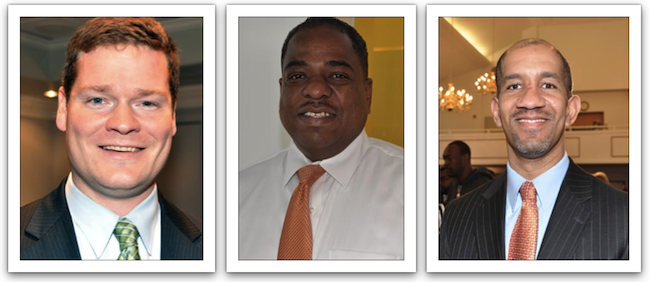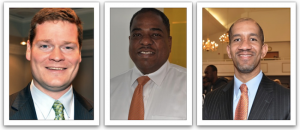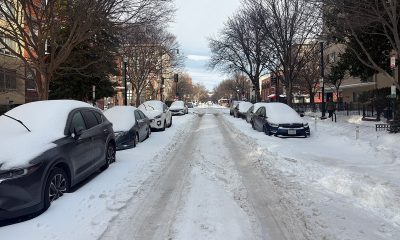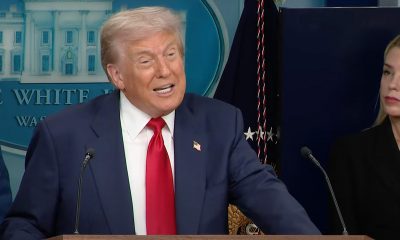Local
Council candidates compete for LGBT vote
Wooing crowds at Town, Nellie’s and Ziegfeld’s as low turnout expected next week

At least four of the nine candidates running in the April 26 special election for an at-large D.C. City Council seat are aggressively courting LGBT voters in a race that political observers say is highly unpredictable.
With special elections known for yielding a low voter turnout, LGBT voters could be the deciding force in the election if they coalesce behind one candidate, according to activists following the race.
Many of the city’s LGBT activists are supporting Democrat Sekou Biddle, a former Ward 4 school board member who won an interim appointment to the at-large Council seat in January. Biddle has expressed strong support for LGBT rights.
But Democrat Vincent Orange, a former Ward 5 Council member, and Republican Patrick Mara, a Ward 1 school board member, have surprised some LGBT activists by recruiting prominent LGBT supporters and by waging active campaigns targeting the LGBT community.
In the Ward 8 race for a vacant seat on the city’s Board of Education, veteran gay Democratic and Ward 8 civic activist Phil Pannell is leading a field of nine candidates in money raised and spent, according to a campaign finance report he filed on April 18, the last report to be filed before the April 26 election.
Pannell has been an outspoken advocate for LGBT rights, including same-sex marriage, in a ward where the majority black population is known to be more conservative on social issues. The Ward 8 Council member, former D.C. Mayor Marion Barry, was one of just two of the city’s 13 Council members who voted against the same-sex marriage bill that the Council approved in December 2009.
“I’m running on a platform that supports the very best in public education for all of our youth, including LGBT youth,” Pannell said last month after receiving the endorsement of the Gertrude Stein Democratic Club, the city’s largest LGBT political organization.
He is the only gay candidate running in the April 26 election, which was called to fill two school board seats – one in Ward 8 and another in Ward 4 – in addition to the at-large Council seat.
His campaign finance report shows he has raised $21,307 as of April 18, with $17,225 coming from a personal loan he made to his campaign. The report shows Pannell spent $10,672 on campaign-related activities as of April 18.
Pannell’s closet rival in the money department is LGBT supportive D.C. home rule advocate Eugene Dewitt Kinlow, who raised $11,133 and spent $3,000 as of April 18. Pannell had $9,471 in cash on hand for the remaining week of the campaign, his finance report shows, compared to Kinlow, who had $7,633 in cash on hand.
The at-large Council seat became vacant after Democrat Kwame Brown, who held the seat, won election last year as D.C. Council Chair. The city’s Democratic State Committee appointed Biddle to fill the seat on an interim basis in January until a “permanent” Council member was chosen in the April special election.
Since the at-large Council seat held by Brown was scheduled to come up for election in 2012, the winner of the special election on April 26 must also stand for re-election in 2012.
Orange has raised more than $261,000 in campaign funds as of April 18, the last required campaign finance reporting period before the election. Biddle’s April 18 finance report shows he has raised just over $175,000 for his campaign, putting him in second place in money raised. Mara’s report shows him in third place in the money department, with $60,559 raised.
Many of the city’s political pundits believe Orange and Biddle are the frontrunners in the race, with Orange having the advantage in funds raised as well as an endorsement by the city’s influential municipal employees union. Biddle has been endorsed by Mayor Vincent Gray, City Council Chair Kwame Brown, and several other Council members, including gay Council member David Catania (I-At-Large).
Mara received the endorsement of the Washington Post, which billed him as a needed independent voice in a city government dominated by Democrats. The Post backing is expected to give his campaign a boost in Wards 2, 3 and 6, where voter turnout is often higher than in the other wards.
Orange came out against same-sex marriage when he ran unsuccessfully for mayor in 2006. Earlier this year, he announced he had changed his position on the issue and now fully supports the right of gays and lesbians to marry under the city’s same-sex marriage law. He also pointed to what he called his long record of support on other LGBT issues during his tenure as a Ward 5 Council member.
Mara emerged as an early supporter of same-sex marriage when he ran unsuccessfully for a City Council seat in 2008. He has billed himself as a “fiscally responsible and socially progressive” Republican who strongly supports LGBT equality. He notes in his campaign literature that he was the only one of the nine candidates now running for the at-large seat who testified in favor of same-sex marriage when the same-sex marriage bill came up for a hearing before the City Council in 2009.
Biddle has said he spoke out in support of the same-sex marriage law when it was pending before the Council. He notes that he was an advocate for LGBT youth related issues during his tenure as a school board member.
Ward 1 Advisory Neighborhood Commissioner Bryan Weaver, a Democrat, has also spoken out in support of LGBT issues at candidate forums across the city. He, too, spoke out in support of the same-sex marriage law and backed an ANC resolution endorsing the proposed law as it was pending before the Council.
Biddle’s gay supporters, including leaders of the Gertrude Stein Democratic Club, the city’s largest LGBT political group that has endorsed Biddle, say they believe Biddle will capture the lion’s share of the LGBT vote. They acknowledge, though, that other candidates are challenging Biddle for the gay vote and could capture some of that vote.
Rick Rosendall, vice president of the Gay and Lesbian Activists Alliance, said that similar to nearly all D.C. elections since the early1980s, virtually all candidates running for public office in the District express support for LGBT equality. According to Rosendall, D.C.’s LGBT community – unlike other cities and states – has the luxury of setting a higher standard for selecting candidates based on their knowledge, understanding and sophistication on specific LGBT and AIDS-related issues.
“It’s not a matter of just saying I support you,” he said. “It’s a matter of demonstrating an understanding of the issues and showing what they will do to address them.”
GLAA, a nonpartisan organization, has rated candidates on LGBT and AIDS-related issues, along with some broader issues, since the group was founded in 1971. Based on candidate responses to a questionnaire and their record on LGBT-related issues, the group assigns them a score ranging from +10, the highest possible rating, and -10, the lowest rating.
In the at-large Council race set to be decided on April 26, GLAA gave Biddle and Weaver a +5.5, the highest rating among the nine candidates in the race.
Mara and Statehood Green Party candidate Alan Page received a +4. Orange received a +3.5 and Joshua Lopez, a Ward 1 Democrat and aide to former Mayor Adrian Fenty, received a +2.5.
Each of the candidates expressed support for all of the LGBT issues and positions raised by GLAA on the group’s questionnaire, including strong support for the city law that legalized same-sex marriage.
The remaining three candidates in the at-large race – Democrats Tom Brown and Dorothy Douglas and independent Arkan Haile – did not return the GLAA questionnaire and had no record on LGBT issues known to GLAA, prompting the group to give the three a “0” rating.
In addition to Kinlow, four other candidates running against Pannell in the Ward 8 school board race expressed general support for LGBT rights and pledged to back policies supportive of LGBT youth attending the city’s public school system during a candidate forum sponsored by the Stein Club. The five are Sandra Williams, Tijwanna Phillips, Larry Pretlow II, and Cardell Shelton.
The other three candidates in the Ward 8 race – Trayon White, R. Joyce Scott and Anthony Muhammad – did not attend the Stein Club forum and have not publicly disclosed their positions on LGBT issues.
Biddle, Mara and Orange have been the most visible of the nine candidates running for the at-large seat in the LGBT community during the past two weeks. Biddle, among other things, hosted a “meet and greet” reception for the LGBT community at the gay nightclub Town last week.
With the assistance of Pannell, who is supporting him, Orange spent Saturday night, April 16, campaigning in several D.C. gay bars, including the Southwest D.C. nightclub Ziegfeld’s, where he spoke to the crowd. Another two Orange supporters, gay Democratic activists Barrie Daneker and Lee Brian Reba, organized an LGBT fundraiser for Orange scheduled for Thursday night at Nellie’s Sports Bar, a gay venue on U Street, N.W.
The Mara campaign, meanwhile, placed full-page ads promoting his campaign and outlining his support for LGBT issues in the Washington Blade during the past two weeks.
The April 26 special election is open to all registered D.C. voters of all party affiliations as well as to independent votes.
District of Columbia
D.C. Black Pride theme, performers announced at ‘Speakeasy’
Durand Bernarr to headline 2026 programming

The Center for Black Equity held its 2026 DC Black Pride Theme Reveal event at Union Stage on Monday. The evening, a “Speakeasy Happy Hour,” was hosted by Anthony Oakes and featured performances by Lolita Leopard and Keith Angelo. The Center for Black Equity organizes DC Black Pride.
Kenya Hutton, Center for Black Equity president and CEO, spoke following the performances by Leopard and Angelo. Hutton announced this year’s theme for DC Black Pride: “New Black Renaissance.”
Performers for 2026 DC Black Pride were announced to be Bang Garcon, Be Steadwell, Jay Columbus, Bennu Byrd, Rue Pratt and Akeem Woods.
Singer-songwriter Durand Bernarr was announced as the headliner for the 2026 festivities. Bernerr gave brief remarks through a video played on the screen at the stage.
DC Black Pride is scheduled for May 22-25. For more information on DC Black Pride, visit dcblackpride.org.
Virginia
Arlington LGBTQ bar Freddie’s celebrates 25th anniversary
Owner asks public to support D.C.-area gay bars

An overflowing crowd turned out Sunday night, March 1, for the 25th anniversary celebration of Freddie’s Beach Bar, the LGBTQ bar and restaurant located in the Crystal City section of Arlington, Va.
The celebration began as longtime patrons sitting at tables and at the bar ordered drinks, snacks, and full meals as several of Freddie’s well-known drag queens performed on a decorated stage.
Roland Watkins, an official with Equality NoVa, an LGBTQ advocacy organization based in the Northern Virginia areas of Arlington, Alexandria, and Fairfax County, next told the gathering about the history of Freddie’s Beach Bar and the role he said that owner Freddie Lutz has played in broadening the bar’s role into a community gathering place.
“Twenty-five years ago, opening a gay bar in Arlington was not a given,” Watkins told the crowd from the stage. “It took courage, convincing, and a deep belief that our community belongs openly, visibly, and proudly,” he said. “And that belief came from Freddie.”
Watkins and others familiar with Freddie’s noted that under Lutz’s leadership and support from his staff, Freddie’s provided support and a gathering place for LGBTQ organizations and a place where Virginia elected officials, and candidates running for public office, came to express their support for the LGBTQ community.
“Over the past 25 years, Freddie’s has become more than a bar,” Watkins said. “It has become a community maker.”
Lutz, who spoke next, said he was moved by the outpouring of support from long-time customers. “Thank you all so much for coming tonight and thank you all so much for your support over the past 25 years,” he said. “I can’t tell you how much that means to me and how much it’s kept me going.”
But Lutz then said Freddie’s, like many other D.C. area gay bars, continues to face economic hard times that he said began during the COVID pandemic. He noted that fewer customers are coming to Freddie’s in recent years, with a significant drop in patronage for his once lucrative weekend buffet brunches.
“So, I don’t want to be the daddy downer on my 25-year anniversary,” he said. “But this was actually the worst year we’ve ever had,” he added. “And I guess what I’m asking is please help us out. Not just me, but all the gay bars in the area.” He added, “I’m reaching out and I’m appealing to you not to forget the gay bars.”
Lutz received loud, prolonged applause, with many customers hugging him as he walked off the stage.

In an official statement released at the reveal event Capital Pride Alliance described its just announced 2026 Pride theme of “Exist, Resist, Have the Audacity” as a “bold declaration affirming the presence, resilience, and courage of LGBTQ+ people around the world.”
The statement adds, “Grounded in the undeniable truth that our existence is not up for debate, this year’s theme calls on the community to live loudly and proudly, stand firm against injustice and erasure, and embody the collective strength that has always defined the LGBTQ+ community.”
In a reference to the impact of the hostile political climate, the statement says, “In a time when LGBTQ+ rights and history continue to face challenges, especially in our Nation’s Capital, where policy and public discourse shape the future of our country, together, we must ensure that our voices are visible, heard, and unapologetically centered.”
The statement also quotes Capital Pride Alliance CEO and President Ryan Bos’s message at the Reveal event: “This year’s theme is both a declaration and a demand,” Bos said. “Exist, Resist, Have Audacity! reflects the resilience of our community and our responsibility to protect the progress we’ve made. As we look toward our nation’s 250th anniversary, we affirm that LGBTQ+ people have always been and always will be part of the United States’s history, and we will continue shaping its future with strength and resolve,” he concluded.
-

 India5 days ago
India5 days agoActivists push for better counting of transgender Indians in 2026 Census
-

 Advice5 days ago
Advice5 days agoDry January has isolated me from my friends
-

 National5 days ago
National5 days agoAfter layoffs at Advocate, parent company acquires ‘Them’ from Conde Nast
-

 District of Columbia5 days ago
District of Columbia5 days agoCapital Pride reveals 2026 theme





















